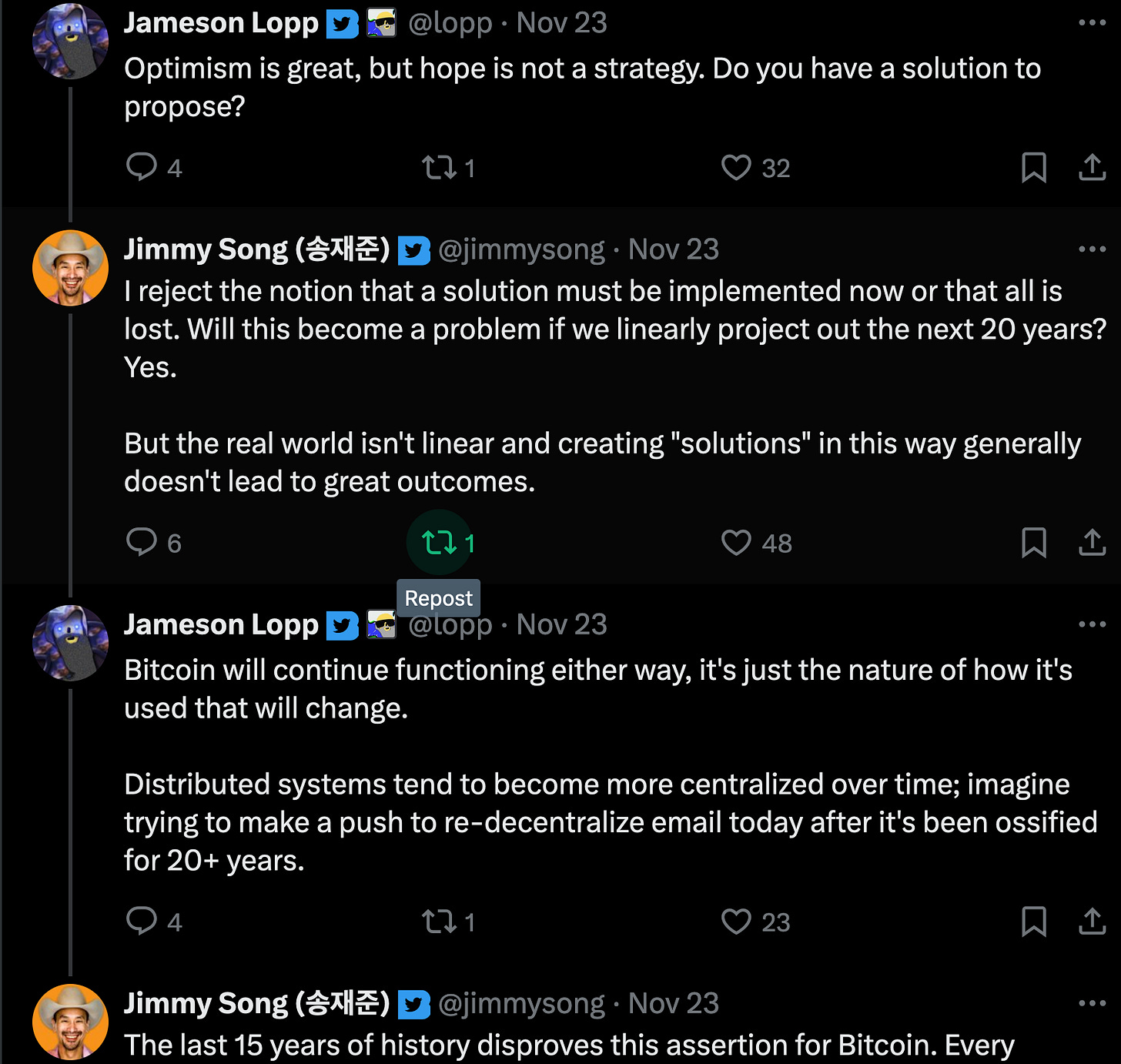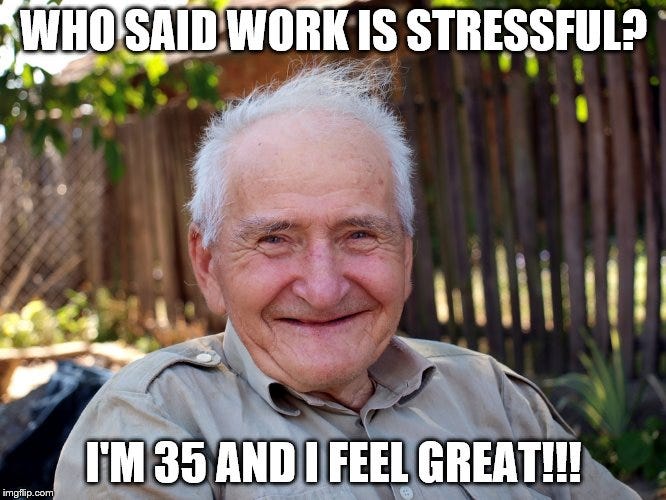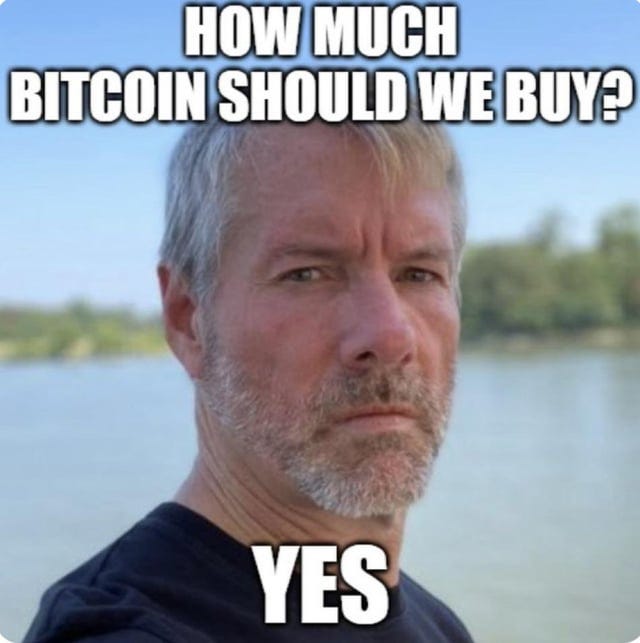Bitcoin Tech Talk #424
Interesting Stuff
Intellectual Laziness - The great Scott Locklin writes a screed on why so many supposedly smart people are idiotic. People basically don’t employ any critical thinking to the news that they’re given and end up trusting, not verifying. As he points out, in a strange way this trust of authorities is oftentimes thought of as a virtue, which of course, is amazingly convenient for the said authorities. Unfortunately, the people most susceptible to this form of intellectual laziness are the most likely to have wrapped their identities around their belief system and are least likely to be convinced by good argument and use their intellectual faculties to rationalize their stupidity. Such are the ways of fiat rent-seeking, and this is a good reminder that most people just don’t want to do the intellectual work.
Conventional Economics and the Soul - This article summed up for me the main problem of the homo economicus construct, that is, the simplification of a human being's spiritual nature, essentially reduced to that of an animal. We are not huperrational actors deciding utility on costs and benefits, but beings with more complex desires and motivations. It is in that sense that conventional economics claims too much and fails. Austrian economics doesn’t make simplifications and derives results from first principles instead, which is why it’s much more effective. As I’ve said before Government economists are the modern day false prophets.
The AI Plateau - This article is about the lack of progress from GPT-4, whose quantum leap from GPT-3 killed a lot of trees with all the articles on the imminent dangers of general AI. As he points out, the only progress they seem to be making is by adding more computing power, which is indicative of the fact that they don’t know what else to do. As I’ve said in the past, we really have no idea how this stuff works or why. Somehow figuring out the probability of what the next word could be has resulted in a pretty well-functioning chat partner. The current plateau, which shows no sign of being quantum leaped, is indicative of this fundamental lack of understanding. I suspect that the obscene sums of money poured into AI will ultimately prove to have been a waste.
Tradeoff Between Freedom and Community - As Bitcoin price has been moving up, I’ve been thinking about what money buys, and for most people, the most valuable thing that money buys is freedom. And while freedom is great, especially at certain points in life, there are tradeoffs and this article is a reminder that these tradeoffs are not insignificant. The main one is that community usually exists where it’s needed, and indeed, it’s much more needed in poorer communities. As you get richer, the lack of dependence generally means a more superficial community. The article posits that you cannot be both maximally free and have deep social connections. I’m not sure that’s true, but it’s worth thinking about to what degree we can maximize both.
What I'm up to
Extension of the Ossification Debate - I had a back-and-forth with Jameson Lopp on X about covenants, soft forks and self-sovereignty. I wish we would have had the time to ask these questions in person, but as it is, it’s a good look into both our thoughts on how Bitcoin should proceed. His view seems to be to keep adding new features into the base layer while I think we should be heavily biased against big changes. The mini-debate brought up a lot of issues at play here, including the desire of Bitcoiners to promote self-custody, but many users simply not wishing to do so.
Bitcoin FUD - This is a free Bitcoin documentary about all the FUD around it and I was interviewed for it. It’s a nice summation of the main talking points that normies have around Bitcoin and a good summary of the various ways in which you can answer the most common propaganda against Bitcoin.
Austrian Economics and Liquidity - I’m looking for resources to study liquidity from an Austrian perspective. My gut feeling is that there’s much more liquidity in general in a fiat system simply because one side of the equation can always be funded by loans from nothing. I’m not aware of any comprehensive treatment of the topic, especially the unseen effects of the reduction in liquidity in a sound-money environment.
Nostr Note of the Week
What I’m Promoting
Bitcoin
Trustless UTXO Ownership - James O’Beirne has another long post on X about what he perceives to be lacking in Bitcoin Core’s priorities. As he writes, the scaling of trustless UTXO ownership is the big issue that needs addressing and not the stuff they’re currently focused on like mempool policy, initial block download and so on. Peter Todd has a thorough response on stacker news.
Mechanics of a BitVM Bridge - Galaxy Digital has written a report on how BitVM can be a bridge to a side chain. Their main interest is the economics angle and what it would take for the various players to make enough money to make the peg in and out work. The main cost for the operator of the bridge is that they are required to front liquidity to the user, and thus must be compensated. They estimate that the users would have to pay in the viscinity of 0.38% for the operator to get 10% APY that they would need to operate.
Inheritance - BitKey has a unique feature that’s rolling out in the next few months and that’s inheritance. The main restriction is that the beneficiary has to also be a BitKey user, and that user can initiate an inheritance claim which is paid out after 6 months. The wallet owner can cancel the claim at any time in the 6 months to retain control. As with most of these things, my main question is, what happens if BitKey goes out of business or is acquired by another company that changes the product?
Lightning
Routing Replay - Matt Corallo identifies in this blog post a common problem for Lightning developers with regard to routing. The best routing algorithms rely deeply on memory of successful routes, and this is very hard to test. This is because test environments don’t reflect the real world where there nodes act a certain way over a long period of time. His data set lets developers test their memory-based routing algorithms reasonably.
lnd Hybrid Mode Guide - As this blog post points out, there are competing requirements for lightning nodes, specifically that of being discoverable and having privacy. The guide is to create an lnd node that has both Tor and Clear IP enabled, for better reliability when connecting to nodes that you have channels with and Tor for other nodes. The idea is to switch as needed and the guide helps you set a node like that up.
Business Models - This is written by Tony Giorgio, who recently stepped away as CEO of Mutiny Wallet. In it he makes some salient points about the business models in the Bitcoin space and his passion for the things that he wants to build not matching the market’s desires. As he says, it’s a bit of a high risk low reward territory. He’s obviously a bit burned out by the experience, but it’s worth reading, because the reality of the VC-funded model is laid bare.
Economics, Engineering, Etc.
MSTR Acquires 51k BTC - They spent $4.6B to buy it and in a year, this may look like a bargain. And that was just in the early part of the week! They’ve also put out a convertible bond at 0% interest with a 55% convertibility premium which was oversubscribed. There’s a lot of chatter about the stock since it was the most traded stock earlier in the week where the NAV premium hit over 3x. It really does seem like they’re fully engaging in a speculative attack as the bull market begins.
Bitcoin Insurance - AnchorWatch is now offering insurance for your Bitcoin if you custody it a certain way, backed by Lloyd’s of London. They seem to be using Taproot and timelocks to vault the coins so the insurer can have more clarity into the security of what they’re insuring. We haven’t really had insurance for Bitcoin, at least at the retail level, and it’ll be interesting to see if this product has a market. Certainly, the peace of mind would be nice, but how can you know it’ll pay out until some other people have gone first? Hence, I expect products like this to get more popular as they prove themselves.
Loaded’s Story - The story of Jimmy Zhong has been fodder for CNBC, but this is the first thorough post of exactly what happened. He was an early Bitcoiner that lived a lavish life until 2023 when he was caught for his connection to Silk Road. The main thing that seems to have done him in is his conflict with Roger Ver in 2017 when he showed a signature from a wallet that was worth $44M at the time. When his assets were seized, he had over 50,000 BTC, which today is worth around $5B. Lots to learn from here, both in terms of Bitcoin security and lifestyle choices.
Quick Hits
MARA $700M Note - Raising money to buy Bitcoin isn’t just a MSTR thing anymore.
Best Whitepaper Translation Ever - Digital signatures are sick, but if you’re still needing a trusted third party to stop double-spending, that’s just sus.
Gensler Leaving - It looks like Trump didn’t need to fire Gensler, he was quitting anyway.
MicroSoft and Rumble - As if all the sat stacking isn’t enough, Michael Saylor is pitching these companies on a Bitcoin treasury.
Fiat delenda est.







